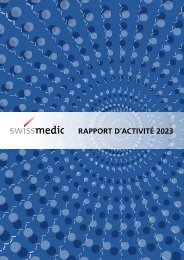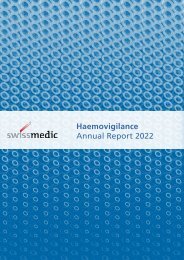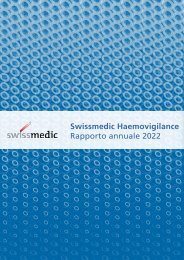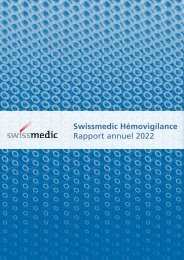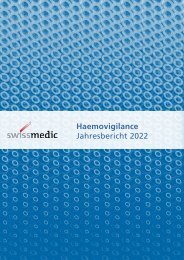Swissmedic Vigilance News Edition 21 – November 2018
In this edition: Isotretinoin and DOAC – Updates Confusion between amphotericin B formulations Guest articles: RPVC Zurich and RPVC Ticino Quality Assurance in Transfusion Practice Statistical Review 2017
In this edition:
Isotretinoin and DOAC – Updates
Confusion between amphotericin B formulations
Guest articles: RPVC Zurich and RPVC Ticino
Quality Assurance in Transfusion Practice
Statistical Review 2017
Create successful ePaper yourself
Turn your PDF publications into a flip-book with our unique Google optimized e-Paper software.
acne itself can lead to depressive symptoms.<br />
Indeed, the rate of depressive symptoms is<br />
higher in patients suffering from acne than<br />
in non-sufferers. The incidence of suicidal<br />
thoughts and mental health problems is<br />
higher in adolescents with severe acne than<br />
those with little or no acne. Consequently,<br />
the age of the target population has to be<br />
taken into account as a confounding factor.<br />
It is acknowledged that the data available<br />
on the subject of psychiatric disorders and<br />
treatment with oral isotretinoin are associated<br />
with a significant number of limitations<br />
that make it difficult to establish a clear link<br />
of causality. Numerous spontaneous reports<br />
of adverse events involve confounding factors,<br />
such as the concomitant medication<br />
and/or a medical history of psychiatric disorders.<br />
Moreover, depending on the indication<br />
concerned, the epidemiological studies do<br />
not allow confounding factors to be ruled<br />
out. Nevertheless, the data presented in the<br />
form of case series, spontaneous reports of<br />
adverse drug events and the individual experience<br />
of patients are considered to be essential.<br />
For the patient whose history is described in<br />
this article, a compatible chronology suggests<br />
that the causality of isotretinoin in this<br />
clinical picture may be rated as possible.<br />
Moreover, the product information for<br />
orally administered isotretinoin-based drugs<br />
mention the rare onset of depression, aggravation<br />
of a pre-existing depression, mood alterations,<br />
anxiety, tendency to aggressiveness,<br />
and the very rare occurrence of suicide<br />
attempts and suicide. The corresponding information<br />
on these drugs can be found via<br />
the following link:<br />
www.swissmedicinfo.ch.<br />
Provided they are considered as judicious,<br />
<strong>Swissmedic</strong> broadly supports the application<br />
of the measures decided in Europe (1) in relation<br />
to products containing isotretinoin<br />
and, more generally, retinoid-based products.<br />
Medical monitoring<br />
In view of the target population and a possible<br />
underlying risk of psychiatric disorders,<br />
it is essential for healthcare professionals to<br />
warn their patients about the potential risk<br />
of psychiatric reactions associated with<br />
treatment with oral isotretinoin. In this context,<br />
particular attention should be paid to<br />
patients suffering from, or with a history of,<br />
depression. It is also essential to look out for<br />
signs and symptoms that are precursors of<br />
depression during the course of treatment<br />
and to monitor these patients. If a patient<br />
develops psychiatric problems, the treatment<br />
with oral isotretinoin may need to be<br />
stopped and, if necessary, appropriate treatment<br />
initiated.<br />
Authors of the relevant literature usually report<br />
that the symptoms appear from a few<br />
days to a few weeks after the start of treatment<br />
and disappear following its termination.<br />
It is possible, however, that stopping<br />
the treatment with oral isotretinoin may not<br />
be sufficient to reduce the depressive symptoms,<br />
and that psychiatric or psychological<br />
measures may need to be put in place. Cases<br />
involving the reappearance of the symptoms<br />
when the treatment with oral isotretinoin<br />
was resumed have also been reported.<br />
All sound reasons, therefore, to undertake<br />
close medical monitoring of patients treated<br />
with oral isotretinoin for the onset of depressive<br />
and suicidal thoughts. Ideally, the<br />
patient's own physician, as well as the dermatologist,<br />
should also be involved in this<br />
monitoring. Before treatment is started, the<br />
patients themselves should be warned of the<br />
risks associated with the treatment in general,<br />
and the risks of psychiatric side effects<br />
in particular.<br />
<strong>Swissmedic</strong> <strong>Vigilance</strong> <strong>News</strong> | <strong>Edition</strong> <strong>21</strong> <strong>–</strong> <strong>November</strong> <strong>2018</strong> 5 | 39




